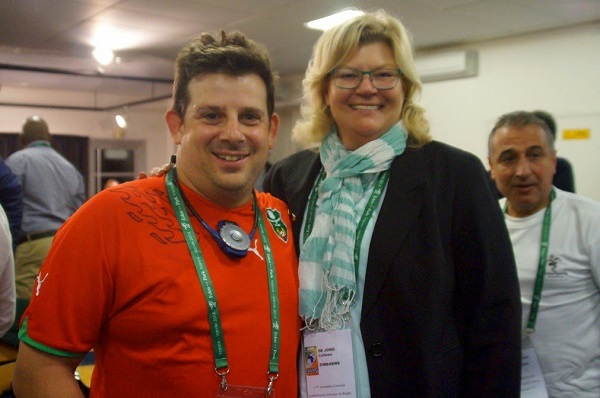
HER passion for rugby saw her rising from a supportive parent who was eager to see her son succeed in his sport of choice, to becoming one of the most powerful figures in Zimbabwean rugby.
BY DANIEL NHAKANISO
Colleen de Jong, the Zimbabwe Rugby Union chief executive fondly remembers when she would brave the chilly winter weather to support her son, Ray who played rugby from the age of eight.
Ray, who is now based in Australia, played in Zimbabwe’s age grade teams before going on to earn two Sables caps as a fullback in 2012.
“My journey with rugby began when my son started playing,” de Jong told Standardsport in an interview last week. “So on a freezing cold Saturday morning I would be there to support him and ultimately I became more involved not just as a mother and spectator, but to the extent where even when he wasn’t playing any more, I remained with the Zimbabwe Under-20 committee.”
De Jong’s career in local rugby administration started in 2007 when she joined the Zimbabwe Under-20 rugby committee. Then under the chairmanship of Aaron Jani and with current ZRU director of rugby Bright Chivandire as head coach, the committee was tasked with mobilising resources for the national Under-20 side.

“I joined the national Under-20 team as an administrator under the very able and inspirational chairmanship of Aaron Jani and Bright Chivandire as head coach,” she said.
“I travelled with the Under-20s to the Junior World Rugby Trophy [now World Rugby U20 Trophy] in Russia (2010), Georgia (2011) and as team manager to USA in 2012. During this time we also hosted two U19 Africa Cup Tournaments in Harare,” said de Jong.
- Chamisa under fire over US$120K donation
- Mavhunga puts DeMbare into Chibuku quarterfinals
- Pension funds bet on Cabora Bassa oilfields
- Councils defy govt fire tender directive
Keep Reading
It was not long before de Jong was co-opted into the ZRU board as executive vice-president by the governing body’s president John Falkenberg, replacing Aisha Tsimba who had resigned following her appointment to the Sports and Recreation Commission (SRC) board.
She resigned from that position last year to take up the post of chief executive officer at the association’s AGM in March and she has never looked back ever since.
“My background of course is administrative but I have a passion for rugby and people in general and I believe that has stood me in good stead. In 2013 when I was invited to come on a more fulltime basis I was more than happy to accept,” said de Jong.
Her defining moment in rugby administration came last year when she was elected to the powerful Confederation of African Rugby (CAR) executive committee following the continental body’s general assembly in Paris last December. De Jong was one of only two additions to the influential body alongside Namibia’s Bradley Basson – and the only female administrator at that level.
The 52 year-old was also part of the ZRU team which played a key role in the bidding process for the World Rugby U20 Trophy together with Chivandire and general manager Sifiso Made.
Zimbabwe was last week confirmed as the hosts of the World Rugby U20 Trophy competition which will take place from April 19 to May 1 next year. The competition will attract teams from South America, Europe, North America, Oceania Europe and Asia.
De Jong is, however, not resting on her laurels and says her ultimate goal is to see the Sables qualifying for the next Rugby World Cup in 2019.
“I’d like to see us qualifying for the 2019 Rugby World Cup. The foundation that we are setting now through the age grade teams will be crucial towards us reaching that goal in four years’ time. We also need to work hard so that we have more test matches played in Zimbabwe and to have our league more decentralised,” she says.
Having been part of a growing number of women who are taking up leadership roles, not only in rugby but sport in general, de Jong credits Zimbabwe for supporting women.
“There was a time when women were just the mothers and made the tea and cakes at rugby matches and functions, but our sport and our country has embraced gender equality,” she said. “Nowadays we have a lot of women who are involved in different capacities and making a difference at all levels, not just in rugby but in all sports.”











